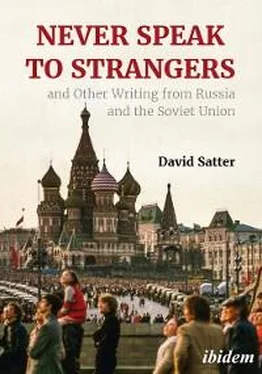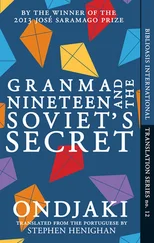First, the dissidents revealed the mechanism of political repression in the Soviet Union. They did this by speaking openly, in that way, refusing to play the roles assigned to them as Soviet citizens in the nationwide political play. This defiance led to arrests that were publicized by other dissidents who were arrested in turn. As the number of arrests grew, more information became available and other dissidents compiled and made public accounts of the system of labour camps and psychiatric hospitals that was used to enforce political conformity. It became undeniable that element holding the system together was fear.
At the same time, the dissidents, by gathering and circulating information, identified the hidden fault lines in Soviet society, calling attention to the plight of persecuted groups—Uniates, Pentecostalists, Jews and Germans seeking to emigrate, nationalists, worker-activists and others—whose situation had been little noticed or poorly understood.
The dissidents also wrote and helped to produce and circulate works of analysis and literature that constituted a free culture. These works, when they became available in the West, discredited the Soviet "experiment" in ways that works written by those outside the society rarely could.
The effect of the dissidents’ activities was to establish a source of truthful information independent and, in some cases, competing for attention in the West with the disinformation apparatus of the Soviet state. This proved highly important. The dissidents were not able to give the West a complete understanding of the character of the Soviet system but they provided enough information to raise doubts about the Soviet Union’s intentions.
By affecting Western public opinion, the Soviet dissident movement, in turn, had an impact on the policies of Western governments. There were those in Western governments who would have preferred to deal with the Soviet Union “pragmatically,” concentrating on what they imagined to be “mutual interests.” But, in many Western countries, the repression of the dissidents had aroused public opinion and made such policies politically impossible. With the expansion of detente era measures advantageous to the Soviet Union, e.g. trade, scientific exchanges and arms control treaties, all of which presumed a degree of trust, there began to be calls in the West for accompanying steps to make the Soviet Union more open and to protect human rights. This led to such measures as the Jackson-Vanik amendment to the U.S. Trade Act and the 1975 Helsinki Agreements which, in exchange for Western acquiescence in the European territorial status quo, committed the Soviet Union to respect human rights and facilitate the free exchange of information. The emotions inspired by the struggle of the Soviet dissidents also helped to motivate the human rights campaign that was initiated under President Carter and represented the first attempt at an ideological counter offensive directed against the moral vulnerability of the Soviet Union.
Because the dissidents had an effect on Western public opinion and the policies of Western governments, they also influenced the policies of the Soviet government. The Soviet authorities could have crushed the dissident movement overnight but behind the dissidents stood the West and it was this that gave the Soviet dissidents their strength.
The first way in which the dissidents influenced the Soviet government was by forcing it to grant limited freedom of written expression. In 1965, Andrei Sinyavsky and Yuli Daniel were sentenced to long labour camp sentences for publishing their works abroad. The international reaction to the case, however, did serious damage to the image of the Soviet Union. Sinyavsky and Daniel served out their labour camp terms but the Soviet Union never again imprisoned a writer for his writing. Alexander Solzhenitsyn was forcibly exiled and Vladimir Voinovich, Vasily Aksyonov, and Georgy Vladimov emigrated under pressure. But in the meantime they and other writers were able to create the non-communist Russian literature that helped to sustain the cultural and moral values of more than one generation of Soviet citizens.
The activities of dissidents also compelled the Soviet authorities, for the first time, to allow mass emigration from the Soviet Union. Before the 1970s, it was virtually impossible to leave the Soviet Union legally. With the birth of the Jewish emigration movement, however, the Soviet authorities faced a choice between allowing Jews to emigrate or accepting the political cost of repression. The decision was made to allow Jews to emigrate under a formula—that they were returning to their “historic homeland”—that opened emigration for Soviet Germans as well.
Finally, the dissidents influenced the government’s policies in the treatment of dissenters themselves. Yuri Galanskov, one of the earliest dissidents, died in a Soviet labour camp but for many years afterward, despite extremely harsh treatment, the Soviet authorities tried to keep well known dissidents alive. They also spaced out the arrests of prominent dissidents, allowing many of them to continue their activities, declined to arrest Sakharov (although he was exiled) and allowed some dissidents to emigrate. As a result, dissent became a somewhat more viable option for Soviet citizens.
The concessions that the Soviet dissidents were able to force from the authorities wrought important changes in Soviet society.
In the first place, Moscow, and, to a degree, Leningrad became centers of serious political discussion. The authorities did not want mass arrests in the capital that would, on the one hand, embarrass them internationally, and, on the other, create new dissidents so they behaved with tolerance toward expressions of opinion as long as they did not take public form. The result of these tolerated conversations was that, when perestroika began, alternatives to the communist system had already been considered.
At the same time, the stream of free information that the dissidents provided (much of it broadcast back to the Soviet Union by the Western radio stations) helped to give moral orientation to a large part of the Soviet intelligentsia. By their example, the dissidents also demonstrated that resistance was possible. As a result, when the controls were drastically loosened in the Soviet Union under Gorbachev, there were millions of people who were immediately ready to assume an active political role.
The story of the Soviet dissidents during the Cold War is the story of people whose power derived solely from the power of an idea. By refusing to participate in the obligatory ideological play in the Soviet Union, they became de facto the defenders of the values of civilization that the Soviet system had been organized to destroy.
It was sometimes argued in the West that the dissidents did not deserve the attention that they received in the Western media, that they were few in number and that they represented no one but themselves. This logic, which would have made sense in a democracy, was completely fallacious when applied to the Soviet Union where political strength derived from ideological subservience and opposition was inevitably, the opposition of an idea. The dissidents were powerful because the idea was powerful and, under totalitarian conditions, they found the strength to represent that idea.
Financial Times, Monday, September 11, 1978
Why Moscow Has Georgia on Its Mind
Whatever others may think of him, Stalin is far from discredited in his native Georgia. His portrait, carried—by street vendors, seen in shoe shine kiosks or glimpsed through labyrinthine courtyards on the walls of workers’ flats, lends a macabre touch to the life of this otherwise lush and sunny republic.
“Everyone makes mistakes,” as one Georgian woman put it.
Читать дальше












